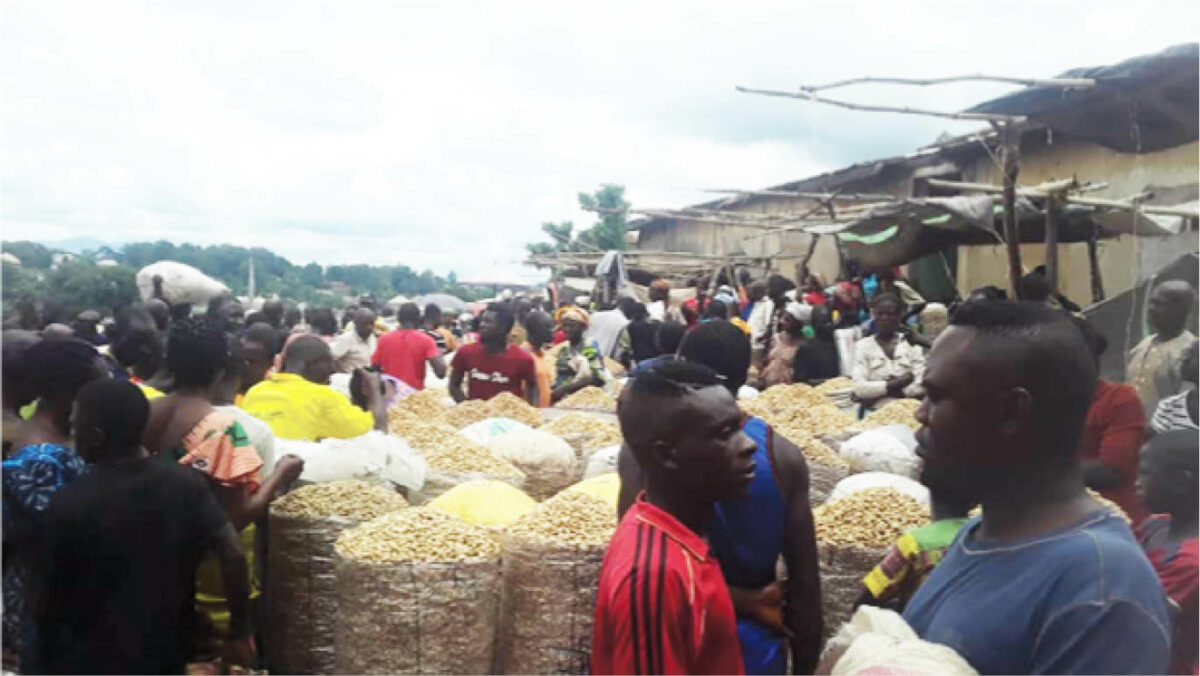Many farmers and agricultural experts have expressed optimism on President Muhammadu Buhari’s recent directive to the Central Bank of Nigeria (CBN) on foreign exchange ban for food and fertilizer importation as a positive step towards strengthening the country’s food and fertilizer production systems.
Buhari had Thursday directed the CBN not to provide foreign exchange for the importation of food items or fertilizer.
- Is Nigeria ready for zero food import?
- Buhari’s zero forex for food import order to be aggressively implemented – Emefiele
Speaking at a meeting of the National Food Security Council at the State House in Abuja, he told owners of businesses which depend on food importation to begin to get their foreign exchange independently.
“Use your money to compete with our farmers, instead of using foreign reserves to bring in compromised food items to divest the efforts of our farmers. We have a lot of able-bodied young people willing to work and agriculture is the answer. We have a lot to do to support our farmers,” he said in a statement by Garba Shehu, his spokesman.
Alhaji Bukar Jibrin, the National President of Sunflower Association of Nigeria, said the directive would impact positively on farmers and the agric sector.
He said the policy would trigger more investments in food and fertilizer production in the country, and as well lead to the resuscitation of all the fertilizer blending plants in the country.
Speaking on the fear that the policy would trigger price increases, he said the problem of commodity prices in Nigeria was created by middlemen, adding that at the farm gate, grains are cheap, something he wants government to critically look into. Several farmers who spoke to Daily Trust were of the same view.
However, some expressed reservations on the policy because they argued that the country is yet to be self sufficient in many areas, which could spark increase in food prices.
Chief Alphonsus Inyang, the National President of Oil Palm Producers and Processors Association of Nigeria, said the directive has to be properly articulated before implementation.
“We are not self sufficient in many areas as far as agriculture is concerned. In as much as we will want to consume what we produce locally, do we produce enough for the whole population? If we don’t, that blanket directive will not be good enough for the economy. This is because we are running an economy with over 200 million people and if you shut down the doors against some specific food items or agricultural products coming into the country, what you have succeeded in doing is to allow 200 million people to pursue what a few Nigerians are producing.
“This will allow forces of demand and supply to take its course and that will allow prices to hit the roof. So that directive should be properly looked into before implementation,” he said.
Citing the oil palm industry, he said, “Even the oil palm we produce is less than 25 percent of what we use. We import oil palm of about $550 million every year. Yet, Nigerian palm oil remains the most expensive in the world. “
He said the policy would affect industries in the value chain which would lead to funny stories about prices.
Bode Mabode, a farmer, views the president’s decision as a noble one that will create jobs and increase local production.
He said the policy would promote local and foreign investment in the sector, which will in turn create massive jobs for the people.
“With this policy, the benefits will be enormous in the coming years especially after COVID-19. Some of the shortages are created by the COVID-19, which is a global phenomenon across many nations,” he said.
The National President of the All Farmers Association of Nigeria (AFAN), Arc. Kabiru Ibrahim, expressed optimism that the directive would further enhance agricultural produce.
“AFAN is also happy with the decision to continue the support to small holder farmers to enable them upscale their production of food crops that will ensure the realization of the much desired food security in the country.
“Nigerian farmers have resolved to work assiduously to bring about food sufficiency and ultimately food security to Nigeria as a reciprocal gesture to the president’s uncommon support to Nigeria’s agriculture.” he said.
Johnson Idowu, an agric economist, while welcoming the local production initiative, however, cautioned over its implementation.
According to him, it is not yet clear if the expected harvest from the rain-fed farming season will have a significant impact on the current high price of food items in the country.
“If we indirectly stop importation of food items, which the directive is actually aimed at, and our present production capacity fails to arrest the current price hike of food items in the country, of course the consequences would be grave,” he noted.
Alhaji Tijani Ahmed, a farmer, said his concern is on fertiliser, adding that the price of fertiliser in the open market is currently beyond the small holder farmers.
He said while the directive is aimed at encouraging local production of the input, he was not sure if the country’s fertilizer blending plant can meet farmers’ demands.
CSOs speak on directive
The Executive Director, Resource Centre for Human Rights and Civic Education (CHRICED), Dr. Ibrahim Zikirullahi, told Daily Trust that the organisation would have been impressed if the present administration had been able to build up a track record of disciplined and consistent policy implementation over the years.
According to him, five years on, the reality on the ground is that this government has clearly lost it as it is always in the habit of making one policy to favour the rich and powerful, and another to punish the poor.
“Otherwise, laudable policies on the watch of this government are regularly subverted by the powerful and highly connected, leaving poor citizens to groan in pains. The policy on rice is an example, despite the so-called border closure, and the ban on rice importation, it is not a secret that there is a glut of foreign rice in the market.
“It is so because some sacred cows are being allowed to continue to bring in imported rice. Therefore, we have not seen anything in the policy implementation record of this government to suggest it will act on the side of the people with this idea of zero forex allocation,” Zikirullahi said.
The president, National Association of Nigerian Traders (NANTS), Mr. Ken Ukaoha, a lawyer, told Daily Trust that the president may be correct on this policy and it is better to be decisive on the policy to follow.
According to him, the closure of the nation’s borders, for instance, was meant to stop the importation of rice and frozen foods among others.
“To that extent, it means that the government is looking at an offensive trade policy that prioritizes exportation. The CBN also listed some 41 items to be banned from importation, thus the same CBN cannot be supporting some of the items, especially on the goods that can be developed locally.
“I want to strongly advise against the waiver granted some companies to import maize in the name of covering the shortfall. Apart from banditry, kidnapping and terrorism among other challenges, Nigerian traders and farmers now have to also contend with flooding. This means that we may run into food shortage next year. Therefore, the Federal Ministry of Agriculture must act immediately and proactively to save the nation from the imminent food crisis,” Ukaoha said.
The Chief Executive, Connected Development (CODE), Hamzat B. Lawal, told Daily Trust that this is the second time in 12 months Buhari had dictated to the CBN to withhold forex on food importers.
According to him, this ostensibly, is to protect local producers (infant industry protectionism, which is never bad in itself no matter some sections of policy circles demonize it) and to conserve scarce forex too.
Hamza said, “Truly, ideological extremism on Buhari’s pronouncement misses the point. The uttermost concern to Nigerians should be saving the country from food crisis, hunger or famine, which COVID-19 and flood devastations across regions are struggling to impose on Nigeria.
“If that be the case, farmers and ago-processors need protection from the sledge hammer of developed nations and their capitalist agents. We have to realise that there should be no ideological format for crying when you must save your country from impending famine,” he said.

 Join Daily Trust WhatsApp Community For Quick Access To News and Happenings Around You.
Join Daily Trust WhatsApp Community For Quick Access To News and Happenings Around You.



